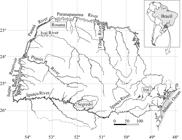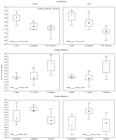The variation in energy in the muscles of the most representative fish species from three Neotropical Reservoirs was investigated to determine the effect of the reproductive process on the amount of energy allocated and a possible relationship between the general welfare of the species and their caloric content. Significant differences were detected between the sexes and among the stages of gonad maturity. In general, the variation in energy in the muscles indicate to be a function of the reproductive cycle. In most examined species, females presented the highest caloric values, reflecting physiological differences in their use of energy, relative to the reproductive process. However, there was no significant correlation between caloric values and the condition factor of any species. Significant differences in the caloric content and condition factor were identified in each species belonging different trophic groups, indicating an effect of food quality on the amount of energy stored in the muscles. We conclude that the analyzed species presented a similar pattern of variation in energy, but that this was not reflected in their condition. In addition, an effect of reproduction and feeding habit on energy allocation was observed in both sexes.
Calorimetry; Condition factor; Freshwater fish; Paraná River basin; Trophic groups

 Thumbnail
Thumbnail
 Thumbnail
Thumbnail
 Thumbnail
Thumbnail


